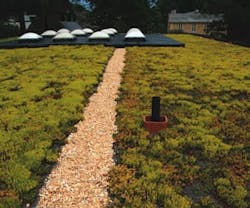Give Your Disposal Plan a Green Boost
There's more to getting rid of your facility's food scraps than just throwing them in the trash. Yesterday's leftovers can become tomorrow's landscaping tool. This month, ComposTumbler customer service manager Mike Taylor discuses options for reducing and reusing food waste in urban environments with InSinkErator's lead environmental engineer Michael Keleman and general manager of food service Bill Sobanski.
BUILDINGS: What's the advantage of treating your food waste instead of just throwing it out as is?
Taylor: There are a couple main benefits to recycling. Specifically from a financial standpoint, we compost here at the office and it's allowed us to have fewer dumpsters, so there's a direct cost savings. You're also talking about a business philosophy of trying to waste less and reuse more, putting less stuff into landfills.
Sobanski: Diverting from landfills is our No. 1 goal. Our pulper units were initially designed to handle the food waste and affiliated waste with it – plastic utensils in a cafeteria, paper waste, cups – extracting the bulk of the water and reducing the volume by 85%. If nothing else, you reduce the volume going into your dumpster.
BUILDINGS: Doesn't food decompose in landfills or dumpsters too?
Taylor: The problem when you're working with landfills is the packaging around the items. It's rare that you throw food waste on top of a landfill and allow it to break it down. It's normally encased in a plastic garbage bag, which helps prevent air from reaching the organic materials, and you need air for any decomposition to take place. You can have waste wrapped up in a bag that can be there for years down the road.
Keleman: Food waste is 70% water, so managing that water in a landfill becomes problematic. The leachate ends up having to go to a treatment plant anyway, so sending it to a plant or digester just makes sense – take the water out. Both composting and pulpers use the waste as resources. If you send this to a landfill, you miss out on the opportunity of utilizing the resources, whether it's the nutrients, nitrogen and phosphorous, or just the carbon itself.
BUILDINGS: Could a food pulper and a compost tumbler work together?
Sobanski: In the last few years, we've been working with various institutions that are actually using our pulping system exclusively for food waste. It's grinding it in very small particles, a quarter-inch diameter or smaller, and a lot of commercial composters say that improves the composting.
Taylor: Any type of mechanism that shreds, chops, or pulps enhances the work of the composter. The smaller the particles you're working with, the quicker the composting process operates. If you take food waste and grind it all down, the remaining material is going to break down at a faster rate than if you just took a whole apple and threw it in the composter.
BUILDINGS: Which type of device is a better fit for which applications?
Taylor: You need to know what you want to do with the waste when you're done with it. Composting is better for waste you're going to want to reuse, whether it's landscaping or giving it away. You also have to recognize how much waste you're generating. Composters are good for smaller applications; if you're talking about a place that has several hundred employees and has its own cafeteria system, that's going to generate more waste than you're going to process through a composter. You may also find it's good to have a variety of different methods of processing your waste. A composter along with a pulper or some other type of processor works for you if you're generating a significant amount of waste.
Sobanski: We've had people successfully use our pulping system in connection with a compost system, and also in an open air compost pile with mixed yard trimmings and yard waste.
Taylor: Even if you can't reduce 100% of the waste, any reduction is a benefit to all of us. Reduce what you can, and then as you get into it, you find more and more ways to reduce waste. When you're working with compost, the purpose is to get that back into nature, whether it's your own landscaping through a green roof scenario or allowing employees to take it home for their own personal use.
